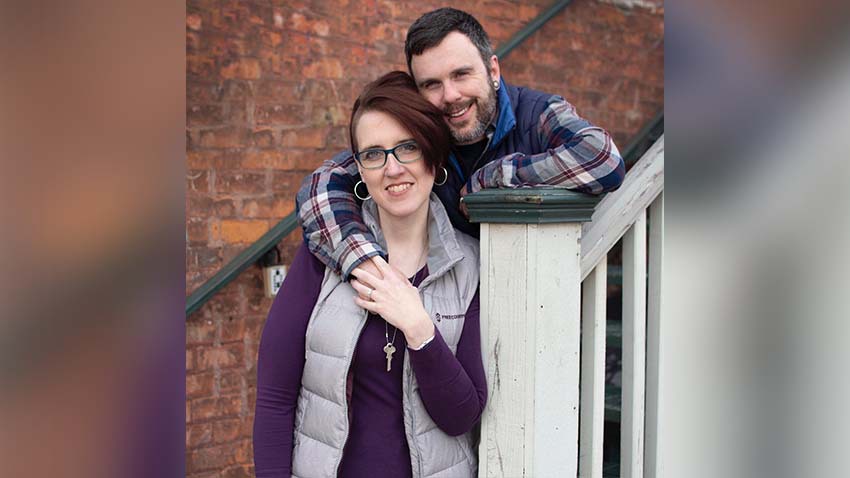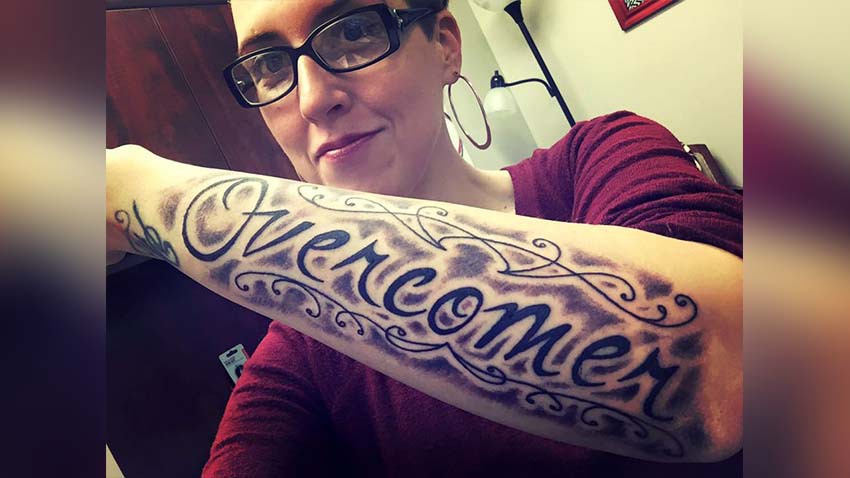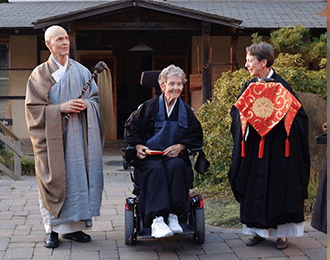MS Patient Shares Message of Hope

Michigan Health – Updated for November 2021
Author: Jane Racey Gleeson
One woman with multiple sclerosis is inspiring others with the disease to start each day new.
Michelle Reed wants to be thought of as a person who overcomes her challenges, not a victim of the things she’s had to face in her young life, including a diagnosis of multiple sclerosis at age 34.
The diagnosis followed the death of both parents when she was 18 as well as the MS diagnosis of her first husband when the two were just 19 and about to be married.
Despite all this, the mother of two daughters and a step daughter is able to keep a positive attitude, exemplified by the words “Hope” and “Again” tattooed on alternate feet.
She’s also committed to telling her story and helping others with MS through social media. Reed’s Facebook page, Hope Again with Michelle Reed, shares hope and inspiration on a regular basis.
“I want to be a positive voice,” she says. “That’s what my Facebook Live segments are all about. I want to be real and acknowledge the difficulties that surround MS individuals and let them know they aren’t alone.”
The first signs
Now 44, Reed remembers her first MS symptom, although she attributed an achy hip to having slept wrong the night before. But when her face began to feel numb, she became concerned that it might be something else. “I wondered if I was having a stroke, or maybe just a pinched nerve,” the Lansing, Michigan, resident says.
A few days later, when she felt extreme pain as shower water touched her leg, she became more anxious. “This can’t be MS,” she thought, wondering what the chances were that she and her husband would both have the same disease.
“I wasn’t accustomed to running to the doctor,” Reed says, but after experiencing a tightness around her abdomen, often referred to as the “MS hug,” she became more alarmed, but admitted, “I was still in denial.”
Ongoing pain finally took Reed to her local emergency room where an MRI proved inconclusive.
“I was hospitalized for five days, then released for Mother’s Day in 2010 with no real diagnosis,” says Reed. But when the pain persisted, she returned to her doctor, who recommended she be seen at Michigan Medicine.
Finally, a diagnosis
Arriving at the Michigan Medicine emergency room, Reed underwent another MRI, which revealed a lesion on her spinal cord.
“They thought it might be a tumor or a nervous system issue so I was given a spinal tap.”
The next morning Reed got the diagnosis she feared most. “It was MS,” she says.
Multiple sclerosis attacks the nerve cells in the brain and spinal cord as well as the optic nerve. Considered a chronic autoimmune disease, MS causes inflammation and damage of myelin, which acts as a protective covering on nerve cells responsible for conducting electrical signals. With MS, the electrical impulses needed for the nervous system to communicate with the body don’t travel properly through the nerves.
Reed was diagnosed with relapsing-remitting multiple sclerosis. With this type of MS, patients experience periodic symptoms that flare up and then subside. For Reed, these include leg pain, neck stiffness, headaches and fatigue.

Where do I go from here?
“I was shocked but relieved to finally know what I was dealing with,” says Reed. “I thought to myself, OK, where do I go from here?”
She returned to her Lansing home and nearby neurologist, but ultimately came back to Michigan Medicine neurologist and multiple sclerosis specialist Tiffany Braley, M.D., M.S.
“The U-M neurology team was amazing and supportive,” she says, noting that Braley was a doctor she felt comfortable with and could trust.
Reed’s treatment began with once-a-week injections of a beta-interferon, which left her with debilitating fatigue for three or four days after each injection. She was switched to a once-a-month infusion known as natalizumab, an effective MS medication but also known to cause a rare brain infection with long-term use. Because of this risk, Reed was eventually started on another infusion known as ocrelizumab, a highly effective medication for active forms of MS that requires twice yearly infusions.
Reed says she’s had only one significant flare up since her diagnosis. “My left hand got stiff and I could only type at my job with my right hand.” She also had an issue with depth perception and says occupational therapy helped with both.
The stress of caring for herself and her first husband, now in a nursing home due to the progression of his MS, led to an eventual divorce. Reed visits him regularly with her daughters, ages 12 and 18, to encourage their relationship.
Keeping a positive outlook
She admits that she now suffers from chronic pain and says her symptoms are different every day. “If I remember to pace myself and take breaks during the day, then I’ll be okay. But if I keep going and going, it hits me like a wall of fatigue.”
But Reed, who remarried her “best friend” a year ago, doesn’t let MS overtake her life. Along with her Facebook postings, she participates in a yearly multiple sclerosis walk and has spoken publicly about her experience.
“One year, my daughter and I spoke at an MS walk,” she says, noting that both daughters are aware of their mother’s challenges and thankful that her condition hasn’t been life-altering.
“My last MRI showed no advancement of the disease and I’m still able to work my full-time administrative job, play the guitar and take care of my family,” she says.
“I know where I am mentally and try to handle what I can,” she says. Being around positive people helps. “There’s a lot of negative talk about multiple sclerosis out there. I have a great support system,” which includes her second husband, daughters, co-workers and pastors at her church.
“Faith is the foundation of my positivity, along with my good friends who I can call at two o’clock in the morning and say, ‘today sucked.’ They understand.”
But there are many others who don’t understand, which is why Reed is also passionate about MS education. “People withdraw when they don’t understand what you’re going through. We need to educate them about MS.”
Reed says her outlook is simple: “Enjoy the moment. Give yourself grace. Say no if you don’t feel up to it.” She wants other patients to realize that MS is different for everyone, but her message to them is the same: Hope Again.
“The words remind me to get up and start each day with fresh hope.”





